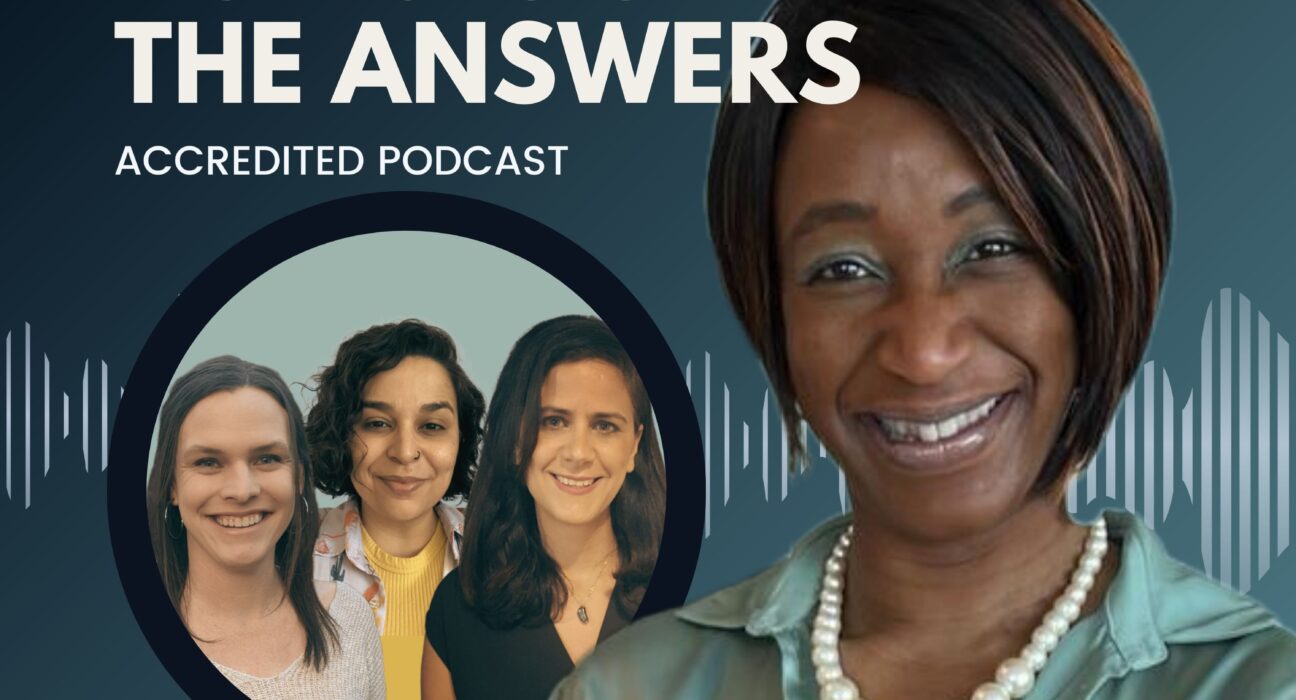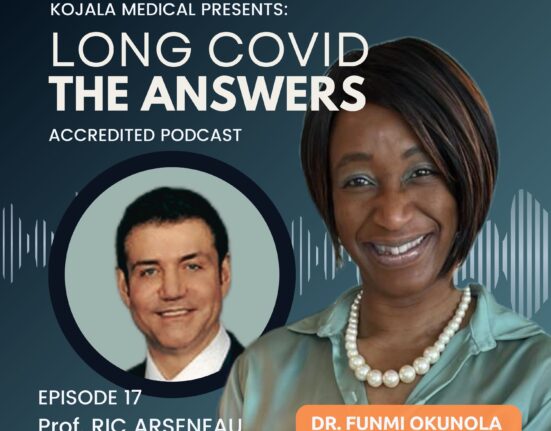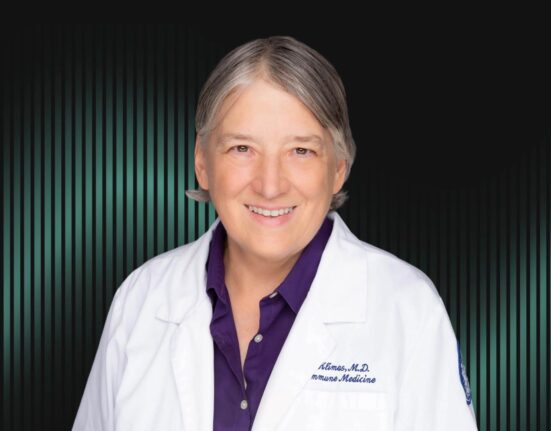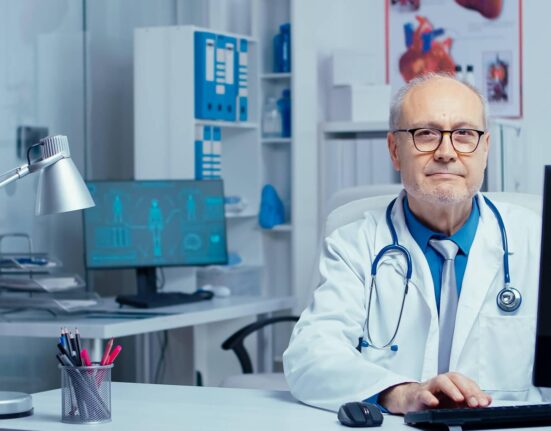
Join our latest episode as we delve into patient-led research reshaping ME/CFS and long COVID advocacy. Discover groundbreaking insights, inclusive research efforts, and the urgent need for funding to sustain this impactful work. Learn how patient voices are driving change in healthcare and advancing equity in medical research worldwide.
Guest – The Patient-Led Research Collaborative
Note: The podcast has no bias. All conflicts of interest are highlighted with individual guests.
Healthcare Professionals | Earn 0.5 Certified Mainpro+® Credits! Please register/login to claim your CPD/ CEU credits.
Podcast Overview:
We highlight the pivotal role of patient-led research in advancing understanding and treatment of long COVID. Drawing from insights of the ME/CFS community, researchers emphasized post-exertional malaise and the broader socio-economic impacts of the condition, such as housing and food insecurity. Efforts to reach underrepresented groups have included partnerships in India and Brazil, focusing on rural and public healthcare populations. Advocates call for sustained funding, inclusion of diverse voices, and greater governmental support. Participatory research has reshaped medical approaches, making findings accessible to patients and clinicians alike, while emphasizing the need for ongoing advocacy and collaborative clinical trials.
Patient-Led Research
- Emphasis on participatory research driven by insights from patients with ME/CFS and long COVID.
- Focus on including post-exertional malaise in surveys and studies.
Advocacy Efforts
- Highlighting socio-economic impacts like housing and food insecurity.
- Advocacy for government prioritization of patient-desired research and clinical trials.
Inclusive Research
- Partnerships to include underrepresented groups in India, Brazil, and rural areas.
- Efforts to engage BIPOC and LGBTQ+ communities in high-income countries.
Sustainability and Funding
- Call for sustained funding to continue and expand advocacy and research efforts.
Medical Impact
- Encouraging the inclusion of post-viral illnesses in medical curricula.
- Making research accessible to patients and healthcare providers.
Future Goals
- Deeper community partnerships, diverse representation, and maintaining momentum for progress.
DISCLAIMER: The information in this podcast is provided for informational purposes only. You should not use any information discussed in this podcast and related materials to make medical or healthcare related decisions. Always consult a your physician or other qualified health care provider with regards to diagnosing managing your medical condition. Any medications or treatments, including any discussed in this podcast, should be initiated and managed by a qualified health care professional.
Podcast Transcript:
Healthcare Professionals: Please note to claim Certified CPD / CEU credits toward your medical license (Canada & reciprocal CPD/CEU Worldwide), you will need to register or log in.
Episode 22 – Patient-Led Research Collaborative Part 1– ft Lisa McCorkell, Gina Assaf & Letícia Soares
[00:00:00] Funmi Okunola: The information in this podcast is provided for informational purposes only. You should not use any information discussed in this podcast and related materials to make medical or healthcare related decisions. Always consult your physician or other qualified healthcare provider with regards to diagnosing and managing your medical condition. Any medications or treatments, including any discussed in this podcast should be initiated and managed by a qualified healthcare professional.
Funmi Okunola: [00:00:00] Welcome to Long COVID-The Answers. Today’s Episode is “Long COVID-The Answers Talks to the Patient-Led Research Collaborative – Part 1.” This is the first Episode of a two-part Episode series involving this organisation. I apologise for sounding nasal today as I myself am recovering from a recent COVID-19 infection.
I’d like to introduce Lisa McCorkell, Gina Assaf, and Letícia Soares, who are all part of the Patient-Led Research Collaborative. The Patient-Led Research Collaborative is a group of Long COVID patients and patients with associated illnesses such as ME/CFS and POTS who are also researchers. They were born out of the BodyPolitik Slack support group and did the first research on Long COVID in April 2020.
They are all researchers in fields of health and science in addition to having intimate knowledge of COVID-19. I first came to learn about Long COVID [00:01:00] through Body Politic and have read and gained a lot of evidence-based knowledge from PLRC’s research. They are really changing the face of medicine by providing scientific research that is patient-focused and have spearheaded advocacy and scientific recognition of Long COVID.
Welcome to Long COVID-The Answers. Thank you. Thank you, Lisa, Gina and Leticia. Do you have any conflicts of interest to declare? No? Good.
Okay. So, today’s interview will be split into two Episodes. First, we’re going to talk about each of your journeys with Long COVID, how you came to be involved in the Patient-Led Research Collaborative, and the aims and objectives of the organization. The second part of the interview will focus on your most recent piece of research as an example of the great work you do.
[00:02:00] Let’s start with Lisa. You are the co-founder of the “Patient-Led Research Collaborative”, which I’m going to abbreviate to PLRC for this show. Could you please tell us a bit about your background, your Long COVID journey, and why you set up PLRC?
Lisa McCorkell: Sure, thank you. Thanks for having us. So, my background is in public policy. I was getting my Masters in Public Policy when I got sick with COVID in March of 2020. So historically I’ve done a lot of work in labor and employment policy and social safety net policy but hadn’t had too much experience in health policy or definitely nothing in medical research.
But when I got sick in March of 2020 and I wasn’t getting any better, I thankfully found the Body Politic support group and joined that, and a group of us who had some experience with research, whether it was from a qualitative lens or in a variety of different [00:03:00] disciplines, saw that people were sharing all of these rich experiences about their symptoms – about their triggers, everything that they were experiencing, and at the time this was about a month into my illness in April of 2020. Very early on in the pandemic no one was really taking these symptoms seriously. They weren’t really being covered in the media, and so we felt like we had to take this into our own hands.
Our doctors were dismissing our symptoms, and really not believing us or not giving us any resources. So, we put out a survey to identify trends, and what symptoms people were experiencing, and just what folks were maybe being helped with, or what might be making their symptoms worse, and we published that just as a Google doc, in May of 2020.
That was really the first research on Long COVID, and the birth of the ‘Patient-Led Research Collaborative.’ We just felt a [00:04:00] need to continue to do that type of research as we kept experiencing our own symptoms. We learned more about what other people were experiencing and felt like we needed to expand our survey. We really felt like we needed to keep doing that work, especially in the face of our doctors continuing to dismiss us and very little attention around what Long COVID was.
Funmi Okunola: Thank you, Lisa. Gina, again could you tell us a bit about your life before Long COVID, your Long COVID journey, and how you became involved with PLRC?
Gina Assaf: Yeah, so my background is in digital design and participatory research for global development and the humanitarian sector. I live in D. C. I used to travel globally and conduct research on design and digital work for communities. I was pretty active before getting COVID.
I got sick early on in March 2020, so I was one of the first waivers. I [00:05:00] had bad fatigue, vertigo, PEM, which I didn’t know that it was PEM at the time- Post Exertional Malaise – we’ll be talking about that a little bit more. My lung capacity got worse. I developed POTS, and so I was pretty impacted. I joined BP at the same time Lisa was talking about and was one of the organizers of BP and helped with that, but then also helped launch a survey that was one of the foundations of PLRC.
I’m also a co-founder and similarly was motivated to get answers. We were not getting anywhere. We found that people in the community were better equipped to help us out with the aggregated data than our healthcare people that we were visiting or seeing. Putting out that first survey and getting answers was really insightful.
So, we continue to do that, and we’re continuing to put out questions that patients are asking that may not be asked as quickly or with the patient insight or that healthcare workers may or may not have. So, I got better with [00:06:00] medications and with pacing – not a hundred percent, but I got a lot better where I was able to work and do a lot more, but then I got re-infected in August of 2024 this year. I had a bit of a setback. So, I’m trying to see where I am with my Long COVID, but yeah that’s my story.
Funmi Okunola: Oh, thank you so much Gina. Letícia, how about you?
Letícia Soares: Yeah. I have a background in ecology and evolution of infectious diseases. I have a PhD in biology, and before getting sick I was for many years doing research in wildlife diseases, mostly malaria, birds.
When I got sick in April 2020, I was doing a post-doc in experimental biology, and I remember getting COVID, and my COVID symptoms themselves were [00:07:00] just different than everybody else’s. I had neurological symptoms at first, and then I had GI symptoms, and then I had respiratory symptoms. So just that experience set me off in what we were seeing that was being said by mainstream media, by public health authorities about the COVID-19 experience itself.
Then I remember reading Fiona Lowenstein’s op-ed in the New York Times. In the op-ed it said that they had started Body Politic, and I was just so excited that there was a support group, and I joined right away. About a year later, I joined PatientLab, and I eventually started co-leading the Reinfections Research Project, and it’s been about a year that I’m part of the leadership group.
In terms of my Long [00:08:00] COVID experience, I’ve been in my first year I was going towards severe illness. I was very, very sick. It took a long time for me to get treatment and symptom management, and just convincing doctors that I had something going on after COVID-19 with all the tests coming back normal.
It was a challenge, but once I got some options, symptom relief and symptom management, I started getting a little more stable, but I’m still housebound currently because of Long COVID. It’s the best way that I can manage the illness. Yeah.
Funmi Okunola: Thank you all for that. What a group of incredibly talented and brave women. I’m just honored to be with you all today. Could one of you or all of you tell me what are the objectives of the organization? [00:09:00]
Gina Assaf: So, I can summarize our mission, which is to improve the breadth, depth and speed of global research into Long COVID and associated conditions, which you had listed before, such as ME/CFS and POTS and others, and to advocate for policies that improve the quality of life for Long COVID patients worldwide.
We achieve this by leading and conducting patient-centered research and partnering with academia and also the industry to provide the essential patient expertise that advance biomedical research, and we use data to advocate for policies that increase the quality of life for people with Long COVID. So that’s a summary of our mission and objectives.
Funmi Okunola: That was succinct and great. What impact do you feel that PLRC has had on the advocacy of Long COVID?
Lisa McCorkell: I can take this. So, we’ve been involved in advocacy around Long COVID really since the [00:10:00] beginning, largely using our own research as well as research that’s come out about Long COVID to really push for evidence-based policies, to push for funding, justifying why that is all needed. Importantly, I think most of our advocacy is done in partnership with other Long COVID groups.
So, we’re close partners with groups like COVID-19, a long hard advocacy project with the Long COVID campaign, Long COVID Moonshot, and we really try to do our advocacy work in partnership with these other groups, both in the Long COVID field as well as broadly within infection-associated chronic conditions, and then also within the disability community.
So that’s a really important piece for us. But, yeah, at the beginning of the pandemic and of Long COVID we helped to really bring attention to what Long COVID was and its impact on people through that first survey, and also [00:11:00] with the help of people like, Ed Yong and journalists who wrote about our work.
That was really impactful in terms of bringing attention to what was happening and describing the kind of characteristics of Long COVID. Another one of our rallying cries early on in the pandemic was bringing attention to COVID testing inequities. Many of the co-founders and early folks in Body Politic were not able to get a COVID test early on because it was so limited or there were a lot of testing inaccuracies.
So now I think largely because of the advocacy that we’ve done there’s a lot more awareness of the testing inequities, and now research and Long COVID diagnoses are accounting for this. We’ve also worked on getting more funding for research for Long COVID as well as funding for other areas of the response to Long COVID like [00:12:00] clinical care, medical education and social support on the research side.
Actually, it covers many different agencies in the U. S. Federal government. We were a key part of the development of the ‘Long COVID Research Moonshot Act’ which was introduced by Senator Bernie Sanders. So that’s another area where we’ve really used our expertise and our evidence-based policies and informed legislation.
Since the beginning of the recovery initiative, we have also really tried to push as well other funding bodies to have more meaningful patient engagement and to also learn from and include other infection associated chronic conditions. This is something that we ourselves have done since the beginning in our first surveys.
We really learned from the ME/CFS community. We incorporated some of [00:13:00] their teachings into our surveys to know how to ask questions – to ask about Post Exertional Malaise. So, we really wanted to also see these larger bodies, the government bodies, to be doing the same thing. We’ve been pushing for that, and I’ve had, especially in the last year, a lot more success with that.
But we’ve also tried to advocate for other government bodies to really prioritize the research and clinical trials that patients want to see. That has been really important to us and something we haven’t seen fully throughout the last four years. We’ve also brought attention to the other types of impacts of Long COVID.
Long COVID can impact the entire person and every aspect of your life. So, I think bringing attention to housing and security, food and security, the impacts to work, and also the holes in our safety net that are failing really all disabled people is important to know.
It’s been a [00:14:00] difficult four years in terms of advocacy, but we also have achieved quite a bit. But all that we’ve achieved is really at risk in the U. S. with the new administration coming in January, and so we really need leaders in government to step up to get bipartisan support, and we need the community to come together and really make their voices heard during this critical time.
Funmi Okunola: I would just like to say you have more than achieved your objectives. You have been phenomenal. I can’t resist saying this even though we’ve got more questions.
Long COVID is now the most researched disease in medicine, and you guys have played a big part in that. You have educated medics like me, who had no concept of what Long COVID was, of post viral illness. In my opinion, that should now be a core subject in medical school curriculums and postgraduate curriculums. The amount that you guys have achieved while sick [00:15:00] over the last four years is absolutely fantastic. Really.
Lisa McCorkell: It was out of desperation.
Funmi Okunola: Well, God, it’s phenomenal, really. We need people like you leading the planet!
A lot of your research participants are white, English speaking and residing in urban or suburban areas in high income countries. How do you plan on reaching people of color and those in low and middle incomes for future research?
Gina Assaf: Yeah, that is so true. We do participatory research. That’s the premise of our work, and who we are as a group is representative of the research we’re doing and who we’re reaching.
So, first of all, trying to make our group safe and inviting to be inclusive of more members is one thing so they can come and represent themselves, and one thing that we’ve been thinking about a lot is partnerships. A couple of examples that we [00:16:00] did where we have been successful in research partnership and one example that I’ll talk about is the work we did in India.
We’re able to develop qualitative research that included farm workers and other people with Long COVID living in rural areas just by partnering up with qualitative researchers who are in India and who communicate and have networks with folks who are generally excluded from health research.
Another example, and I think, Letícia, you probably can speak to this more since you were involved in this, is the study that we did with the Harvard Chan School of Public Health and the London School of Economics with the research in Brazil.
Letícia Soares: Yeah, we have a collaborative project that also involves researchers from the Osvaldo Cruz Foundation here in Brazil, and what we’ve been able to achieve with this collaboration has been really amazing because we were interested in understanding the experience of [00:17:00] people with Long COVID in the city of Rio, especially people who were using the public health system. So, we designed the study all focused on those demographics. We use just a little bit different research methods. For example, the survey was done over the phone, so lots and lots of people just calling and trying to get participants on the phone.
The design of the survey itself, for example in Brazil, we don’t have awareness about Post Exertional Malaise, but we wanted to survey that. So instead of asking “Do you have, do you experience Post Exertional Malaise?”, we defined Post Exertional Malaise in an assessable way. We didn’t add the jargon, and people identified with the symptoms, identified with the phenomenon of Post [00:18:00] Exertional Malaise, and we could detect that in a sample that is 50% Black and both socioeconomic backgrounds, that 50% of these people experience post traumatic stress disorder which is, I think a very important finding for Long COVID.
Funmi Okunola: That’s great and that’s really good to hear because low- and middle-income countries really have been neglected in the pandemic, not just with vaccination, but also with all forms of research.
Then for BIPOC communities in high income countries there’s a legacy through colonialism, of distrust of scientists and medical research because they were abused through those avenues. So, it does take a bit more work and engagement to build that trust, and the connections you’ve made with low- and middle-income countries from that perspective is definitely the way to go because every country, even if it’s low or middle income, has some form of scientific [00:19:00] representation. So, yeah, building those partnerships and trust is fantastic!
What plans do you have for engaging with BIPOC communities, also LGBTQ+ communities in high-income countries? Do you have any plans for that or also in low- and middle-income countries?
Gina Assaf: Yeah, I mean, I think similarly we want to have more partnerships with folks, and we do have members that are part of those communities. But I think one thing we’ve been thinking about is figuring out how to bring them to be part of the leadership group as well, and to include them as part of the membership and to make the group feel more inclusive.
These are things we’re evaluating. More recently we actually did a health equity framework kind of examination of ourselves to see where we are on different levels of that, and I think by doing more reflections and evaluating ourselves, hopefully that will lead to us improving on all of those kind of metrics so we can be more [00:20:00] inclusive of folks in our group itself, and in that sense, build those partnerships as well. Right?
Funmi Okunola: Yeah, that’s great. I’d like to refer you to one of our earlier interviews with the former head of the American Association of Medicine. He was involved with some research around vaccinations, and they approached the Latino community in the States.
They did that through community leaders – the medical profession formulated relationships with community leaders. I guess also in the Black community it would be people like pastors. (And) then they gained the trust of the population, provided Spanish speaking researchers and had a very successful process of vaccination through that. So, I see that in high income countries you actually have to go out and gain the trust of the community leaders, and also provide, I think, compensation for participants because they’re often in low-income jobs and really can’t afford.
There’s also some [00:21:00] challenges with literacy, and a lot of people, as you say, don’t understand or realize that the symptoms they’re experiencing are from Long COVID. It’ll be like, “Oh, I’m just a little slower, and I don’t know why.” So, it just takes a bit more effort. Is there anything on hand for that? Or are you thinking about that?
Letícia Soares: Yeah. We recognize that it is very important to make these partnerships, and I think it is one of the intrinsic limitations of the work that we do. At the same time, it is a plus, and so we have lots and lots of volunteers. We’re very passionate about doing everything that we do, but volunteering, especially volunteering with a chronic health condition, it does eliminate some people who don’t have the privilege to engage in this activity. So, one of the things that we really, really want to do is to be able to pay more people to do this type of work, and this is a call [00:22:00] to funders if anyone wants to help us do this. It is paying people to be engaged in this work so that we can enable these solid partnerships and enable people to be part of all of this work that we are doing.
Funmi Okunola: Okay. Thank you. We’ll include a link to your donation page in the show notes so that the audience can do that. What wider impact do you feel that PLRC has had on medical research now and in the future?
Letícia Soares: I think the biggest impact is the fact that patient participation in research and patient-led research and patients setting the standards of what it means to be meaningfully engaged with patients in your research has completely changed the landscape.
As we work with [00:23:00] researchers I have seen from the beginning to the very end with the data, how much researchers themselves change the way they see the illness, the way they see the patient, and they recognize the huge impact that lived experience and knowledge combined with expertise can make in biomedical research in general.
Funmi Okunola: Lisa or Gina, did you want to add to that?
Gina Assaf: Yeah. I can add as well. In general, I think participatory research is something that we all know is pretty impactful, and in all fields is really important. It has been amazing to see in action the health care system with Long COVID be applied, and I think an example of how it can be done. Not that we’re the first to do it, but I think just the example and what it has achieved is really cool. We also put our work, and others work in scorecards or put our [00:24:00] framework to evaluate patient-led work.
So, I think that’s also been something that can have an impact for other patients, for other work. We have people who can evaluate themselves on patient-led research measures, which I think is also an advancement in the medical research and for the future that could be helpful.
Lisa McCorkell: Yeah, and I’m hopeful that even with things like, not necessarily basic research, but for things like reviews we’ve been able to be co-authors on two reviews at this point.
The first one was with Dr. Eric Topol last year in 2023, and then this year with Dr. Ali, and I think both, especially the first one, have gotten just a ton of attention. It was the third most accessed research paper in 2023 across all disciplines.
Yes, there’s a lot of attention on Long COVID. So that’s part of it. But I also think the way that we wrote it was not just so that it [00:25:00] would be accessible to medical practitioners and researchers. It was really so that patients could read it, like a lay person could read it, and be able to take it to their doctor and be able to share it with their family.
It wasn’t just focused on one audience which I think a lot of research is written in that way. So, I think that’s also the benefit of having patients and people who are thinking about multiple audiences partnering on these types of projects is really having just the audience be larger and therefore the impact is more. I’m hopeful that more partnerships like that will continue, and we’ll see that in other disciplines.
Funmi Okunola: Thank you. So, we’ve nearly run out of time, and I just wanted to end this interview with maybe each of you saying a line of what you’d most like to see from PLRC going forward into the new year.
Gina Assaf: I think to [00:26:00] your question about representing more BIPOC, more diverse, more, non-white English-speaking folks, that would be my priority, and an area that would be really great to do just because they are underrepresented, and I think it’s an area that we can do better at. So, for now I hope that’s what we can aim for and put out there. Thanks.
Lisa McCorkell: I would say I agree – deeper partnerships. One of the things that I was going to mention earlier is we’d love to do a project with community health workers, and that’s such an important area, and one way that we can establish meaningful partnerships with folks that are seen in their community as trusted healthcare providers. So, I’d love to work on something like that, and then just maintain momentum. This is really difficult work.
We don’t have a lot of funding behind [00:27:00] us. We’re all sick. It’s tough to keep this going. So just maintain momentum and sustainability and just like really trying to keep it going.
Funmi Okunola: Great. Letícia?
Letícia Soares: Yeah. I was just going to comment on funding as well. We have so many great ideas, and one big passion of our team is to make it work in terms of getting more diverse people into the LRC, but also to build these relationships with communities that are the most impacted by COVID-19, and are the most impacted by COVID, and are disenfranchised from research and medical care. But we really need funding. We need sustained funding to be able to do that.
I also hope that with this sort of [00:28:00] frame that we can continue to have an impact on clinical trials for Long COVID. We’re pushing for them and getting patients involved in the design of clinical trials and researchers listening to patients. Thank you very much.
Funmi Okunola: Oh, that was such a wonderful interview. Thank you, Lisa, Gina and Letícia for such a great interview. Please join us next week for another Episode of Long Covid-The Answers.
Funmi Okunola: Some-questions for listeners to consider.
What are your top five takeaways from this Episode?
How will this Episode change your practice or perception of this disease?
What will you do to act on what you’ve learned?
Please discuss your thoughts on our social media outlets such as Twitter or X, our website blog, Instagram, Facebook, LinkedIn.
Please rate this Episode.
SHOW NOTES:
Three members of the Patient-Led Research Collaborative – Lisa McCorkell, Gina Assaf & Letícia Soares are interviewed by Dr Funmi Okunola about the organisation and the work it does.
REFERENCES








